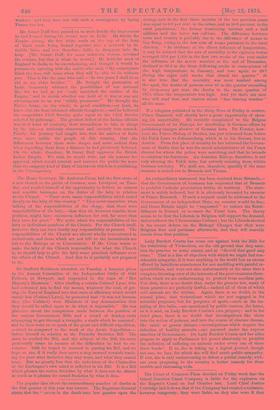Lady Burdett Coutts has come out against both the Bills
for the restriction of Vivisection, on the old ground that they sanc- tion the practice to some extent, and so "do evil that good may come." That is a line of objection with which we might feel con- siderable sympathy, if it were anything in the world but an excuse offered by fastidious consciences for not meddling with painful re- sponsibilities, and were not also unfortunately at the same time a complete throwing-over of the interests of the poor creaturesthem- selves which we are endeavouring to protect from needless pain. For, first, there is no doubt that, under the present law, many of these practices are perfectly lawful,—indeed all of them of which wild animals are the victims. Again, there is no doubt, in the second place, that vivisections which are not engaged in for scientific purposes, but for purposes of sport,—such as the im- paling of live baits,—are sanctioned by public custom, the latter, as it is said, on Lady Burdett Coutta's own property; and in the third place, there is no doubt that investigations like those into the action of poisons, and into the, course of obscure disease, like cattle or grouse disease,—investigations which require the infection of healthy animals,—are pursued under the express sanction of Government. Do Lady Burdett Coutts and her allies propose to apply to Parliament for power absolutely to prohibit the infliction of suffering on animals under every one of these three heads? If so, she is taking- up a logical ground, though not one, we fear, for which she will find much public sympathy. If not, she is only endeavouring to defeat a partial remedy, with- out even proposing to the country a better remedy for these terrible and increasing evils.


































 Previous page
Previous page